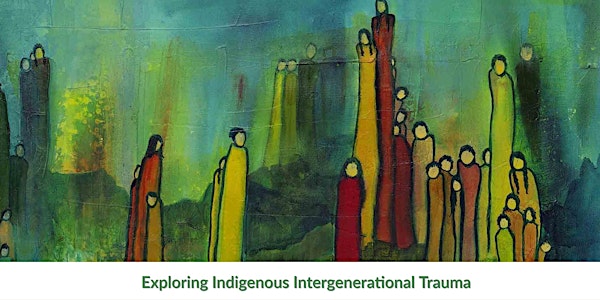
Exploring & Healing Indigenous Intergenerational Trauma
Exploring the Healing of Indigenous Intergenerational Trauma and Residential School Trauma
Date and time
Location
Online
Refund Policy
About this event
- 5 hours 30 minutes
F or additional dates for this workshop and other Trauma-Informed and Resiliency-Informed Practice Training workshops, please see: Trauma-Informed Practice Trainings
Image above is: "Emerging Innocents" by artist Karen Goodfellow. Image recopied with artist permission
WORKSHOP DETAILS:
Trauma-Informed Practice Training: Exploring the Healing of Indigenous Intergenerational Trauma and Residential School Trauma
This advanced workshop deepens understanding of indigenous intergenerational trauma from a theoretical, systemic, arts-based, experiential framework. Through a respectful lens this training will cover the foundations of healing the emotional, physiological and spiritual aspects of trauma, and the legacy of trauma from Canada’s residential school system, including the resurfacing of grief and complex trauma from the uncovering of unmarked, undocumented gravesites.
This training helps to fill what we notice as a lack of framework around working with indigenous clients who are suffering from intergenerational and residential school trauma. It is a slow and complicated process, due, in part, to the complex intersectionality between intergenerational indigenous trauma, racism, bias and cultural competence.
As an advanced workshop, a foundational base of trauma informed practice is encouraged. While this training is customized for those in the medical and healing professions, it is open to any one with a basic knowledge of trauma informed practice.
Past participant feedback:
"I just want to say that I have taken many trainings on healing intergenerational trauma in the past, and this one has been the best by far!" - participant feedback from Nov 2023 training.
"This training created space for individuals to learn alongside one another; this training was both educational and experiential, in that we learned rich educational content, but we also engaged in discussion, to which we learned from the stories of one another, or the stories of those who have walked the journey of trauma before us. This seminar was an incredible opportunity to honor Indigenous peoples through active participation in celebrating Indigenous culture and modes of healing." -Hannah Hube
"Thank-you for the safe space to learn, question, consider, and practice decolonization and indigenous needs within the counselling context. Trish and Karen were an excellent team of wisdom, experience, care and encouragers of positive change". - Caylan Climpson
Thursday, November 28, 2024
TIME: 9:00AM am to 2:30PM PST - Pacific Time (US and Canada).
ONLINE ( Using Zoom. Participants sent link to room 48 hours prior to the workshop start time)
Certificate of Completion will be provided.
*Please note - if you would like to attend this workshop but are unable to due to experiencing financial hardship, please contact us.
Topics Covered:
- Review: what is trauma and
- The neurobiology of trauma
- Defining decolonization
- Understanding a decolonized approach to healing trauma when working with indigenous clients
- Understanding indigenous intergenerational trauma
- Exploring the differences and similarities between a colonized approach and a decolonized approach in healing trauma
- What is meant by a Two-Eyed Seeing approach to healing intergenerational trauma
- Impacts of neo-colonialism on intergenerational trauma
- “Trauma Enduring”: how to navigate trauma resurfacing from the uncovering of unmarked and undocumented gravesites.
- Indigenous Emotional Labour and the Conundrum of Visibility (potential for reinforcing traditional colonial-settler dynamics)
- What is meant by “vertical lineage pass-down” vs “horizontal survival”
- Transference and counter-transference. Getting curious how this may be showing up and a potential barrier to healing
- Self regulation and co-regulation practices for healing
- Self care practices and resourcing tools
- Indigenous cultural practices for healing trauma
- Healing trauma through ancestral teachings and traditional practices
- Using indigenous arts and other expressive arts as a valuable tools in trauma healing
FACILITATORS:
Karen Goodfellow MTC, RCST, CFA
Karen Goodfellow is a Professional Facilitator, Master Therapeutic Counsellor/Supervisor and artist. Karen has decades of diverse experience in the area of trauma resolution , corporate and personal development, professional facilitation, and various therapies (registered craniosacral therapist, Somatic Experiencing Release™ for Trauma); along with a Certificate in Fine Arts from Emily Carr Institute. Karen is also a Counselling Supervisor to St'át'imc Nation’s mental health team. In these capacities she has facilitated over 30,0000 clients to date. As an indigenous person (Squamish First Nation, Katzie First Nation and Sto: Lo) with a familial history of residential schools, she uses her own process of reclaiming her cultural identity to educate, inspire, and support workshop participants with tremendous skill and heart. Recently Karen has been providing multi-day Trauma-Informed Coaching programs to organizations and training to hospice volunteers in Advanced Grief Support. Her focus has shifted from Fortune 500 type of companies to Downtown Eastside organizations. Karen thrives on tapping into the inherent health that resides within individuals, couples, groups and teams. Her facilitator style is learner-centered, fun and safe and her sessions cover all learning styles: experiential training, theory, self-reflection, creative process learning, workshop, and group discussions.
Trish Walsh BA, MTC
Trish is a Master Therapeutic Counsellor, Instructor, and Trauma-informed Training workshop facilitator, located in Vancouver, British Columbia. From 2008 - 2016 Trish was the Executive Director of the InnerChange Foundation, a Canadian foundation for addiction and mental health where she worked with the provincial and federal Government, researchers, clinicians and international experts to help increase research and education in the area of addiction and concurrent disorders. Over the last decade Trish has been providing trauma-informed trainings to university students, mental health professionals, allied health professionals, and the general public. Trish has also consulted for several organizations to bring health information to their staff, stakeholders, and the general public. She has a particular passion for conveying research information in an engaging and easy to understand way, aiding decision makers in their funding and public policy decisions, and helping individuals to learn practical strategies for better health, happiness, and personal success. For more info: www.trishwalsh.ca